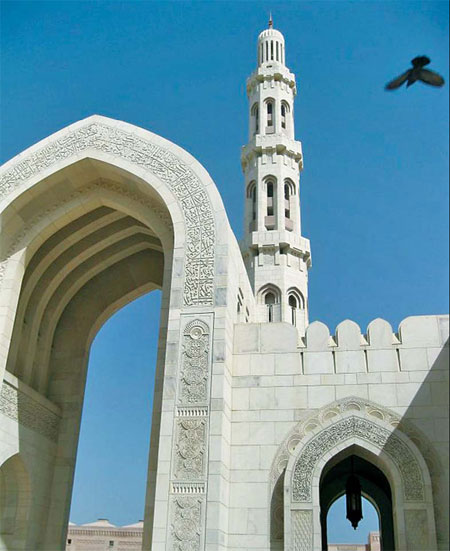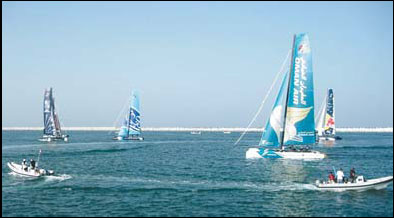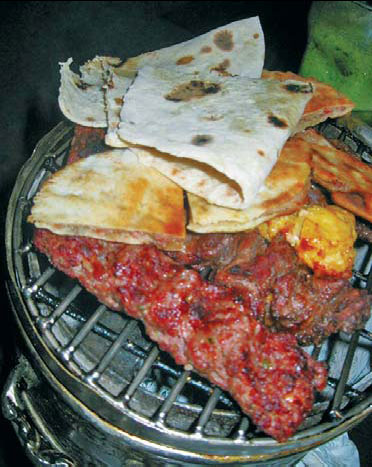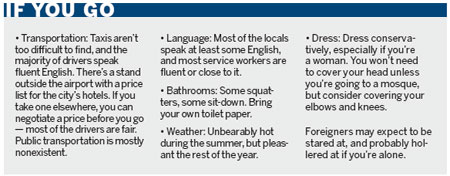Unexpected Oman
 |
|
The Sultan Qaboos Grand Mosque, the third-largest mosque in the world, is a signature architecture of Muscat. Photos by Dusty Lane / China Daily |
 |
|
A sailing race is held outside the city in a new venue called the Wave. |
 |
|
Grilled meat, fresh bread and hummus are all part of a traditional Omani dinner. |

Tiny sultanate boasts sailing, good food and architecture that will keep your camera in high gear, Dusty Lane discovers.
Face it - odds are, you're never going to visit the Sultanate of Oman. As a vacation destination, the Middle East doesn't exactly jump off the map. Putting that aside, the UAE is right next door, and is more geared toward tourism. Spin a globe and point to spots you want to visit, and Oman probably won't crack your top 100.
Which is a shame. Apart from being in an unsettling part of the world, there's almost nothing to dislike.
Great food, great weather - the only real problem is you're probably going to catch flak from your family when you tell them where you're going.
My wife and I traveled to the capital, Muscat, in late February. Muscat sits on the Arabian Sea, its population 735,000.
I was there on assignment to cover a sailing race just outside the city in a new venue called the Wave, the city's most aggressive foray into tourism and residential development.
The Wave also features a coast-hugging links-style course, Almouj Golf, designed by former PGA star Greg Norman.
Muscat is a wealthy city. Natural gas and oil fuel an economy in which citizens average 2.5 cars per adult.
Oman was voted the second-cleanest country in the world - trailing only Singapore - as well as one of the safest. The crime rate is low, and gas is cheaper than water.
No word on the ranking of the food, but it deserves to be high up.
Our meals were heavy on grilled meat, fresh bread and hummus. Lots of hummus.
We went out to a traditional Omani dinner (the highlight was meat skewers on a personal grill) - and it came with nearly perfect hummus. Same with a Turkish dinner. Even the basic buffet at our hotel served outstanding hummus with every meal.
You're going to eat well here.
Muscat's signature is the Sultan Qaboos Grand Mosque, the third-largest mosque in the world.
Visiting it will cause you to do two things: Pretend you're a professional photographer, and develop goosebumps.
The mosque was commissioned by Sultan Qaboos bin Said al Said, who apparently figured that if you're going to pray for an hour a day, you might as well do it in style.
A gift to the citizens, it was a six-year project that wrapped up in 2001.
Nothing was done on the cheap. Chandeliers are from Turkey, glass from France, teak from India, marble from Italy.
The outside is all gardens and fountains, minarets, arches, halls, birds - every five feet, there's a new reason to take out the camera.
At the center is the men's prayer hall (take your shoes off before you go in). It is 74.4 meters long, 74.4 meters wide, with a capacity of 6,600 worshippers.
Even the rug is art. At the time it was installed, it was the largest single-piece carpet in the world (it's now second-largest). Woven by Iranian artisans, it weighs 21 tons and covers more than 4,300 square meters.
The women's prayer hall is much smaller, but it has something the men's doesn't - flat-screen TVs. If you want to watch the goings-on in the men's prayer hall in HDTV, the women's prayer hall is the place for you.
Across town in Old Muscat is the Sultan's Al Alam Palace.
There's no other way to describe it - with its blue-and-gold facade, it wouldn't be out of place as a Disneyland attraction. Tourists aren't allowed inside, but there's a large area outside for picture-taking.
Near the palace is the Old Muttrah Souk, considered one of the best public markets in the Middle East.
It is, in most ways, the polar opposite of Beijing's markets. Sellers are forbidden to fleece customers by mislabeling items or selling counterfeits.
The atmosphere is great, with low-key salespeople and the constant smell of burning frankincense.
Prices are reasonable to begin with, and negotiations are generally laid-back and friendly.
Much like most of Muscat.
Contact the writer at dustylane@chinadaily.com.cn
Related Readings:
















